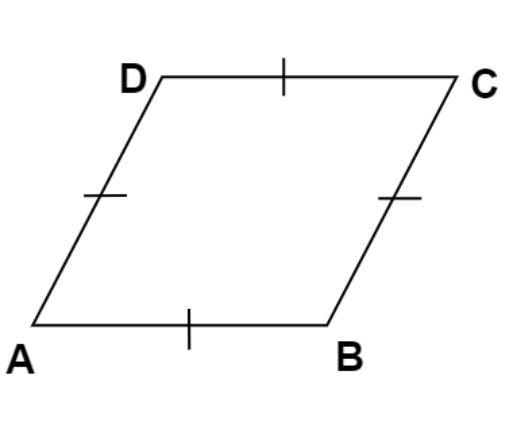
When is a Rhombus a regular polygon?
Answer
487.2k+ views
Hint: Here in this question, we have to explain when a Rhombus is a regular polygon. In order to explain this, first we need to consider a Rhombus and its properties. After that we need to consider the properties of regular polygons. If the conditions or properties are satisfied by the Rhombus, then it’s called a regular polygon, otherwise it’s not a regular polygon.
Complete answer:
A polygon is a regular polygon when all of its sides and all of its interior angles are equal. It means regular polygons must be equilateral (all of its sides are equal) and equiangular (all of its angles are equal).
In geometry, a Rhombus is a four-sided polygon having all the sides equal in length. Also, it is a special type of parallelogram in which opposite sides are parallel, and the opposite angles are equal.

Here, \[AB = BC = CD = DA\]
\[\angle ABC = \angle ADC\] and \[\angle DAB = \angle DCB\]
Now, by the properties of Rhombus,
All the sides are equal and opposite angles are equal, but for a regular polygon all the sides must be equal, and all the interior angles must be equal.
Hence, Rhombus can never be a regular polygon.
Note:
Always remember, a regular polygon should be both equilateral and equiangular. Rhombus is only equilateral but not equiangular. Also, if the rhombus satisfies equiangular condition, then each of its four interior angles must be equal. And we know that the sum of all four interior angles is \[360^\circ \]. Hence, each angle must be a quarter of \[360^\circ \] , that is \[90^\circ \]. Hence, if the rhombus satisfies both the conditions to be a regular polygon then the shape will be a square.
Complete answer:
A polygon is a regular polygon when all of its sides and all of its interior angles are equal. It means regular polygons must be equilateral (all of its sides are equal) and equiangular (all of its angles are equal).
In geometry, a Rhombus is a four-sided polygon having all the sides equal in length. Also, it is a special type of parallelogram in which opposite sides are parallel, and the opposite angles are equal.

Here, \[AB = BC = CD = DA\]
\[\angle ABC = \angle ADC\] and \[\angle DAB = \angle DCB\]
Now, by the properties of Rhombus,
All the sides are equal and opposite angles are equal, but for a regular polygon all the sides must be equal, and all the interior angles must be equal.
Hence, Rhombus can never be a regular polygon.
Note:
Always remember, a regular polygon should be both equilateral and equiangular. Rhombus is only equilateral but not equiangular. Also, if the rhombus satisfies equiangular condition, then each of its four interior angles must be equal. And we know that the sum of all four interior angles is \[360^\circ \]. Hence, each angle must be a quarter of \[360^\circ \] , that is \[90^\circ \]. Hence, if the rhombus satisfies both the conditions to be a regular polygon then the shape will be a square.
Recently Updated Pages
Master Class 10 Computer Science: Engaging Questions & Answers for Success

Master Class 10 General Knowledge: Engaging Questions & Answers for Success

Master Class 10 English: Engaging Questions & Answers for Success

Master Class 10 Social Science: Engaging Questions & Answers for Success

Master Class 10 Maths: Engaging Questions & Answers for Success

Master Class 10 Science: Engaging Questions & Answers for Success

Trending doubts
What is the median of the first 10 natural numbers class 10 maths CBSE

Which women's tennis player has 24 Grand Slam singles titles?

Who is the Brand Ambassador of Incredible India?

Why is there a time difference of about 5 hours between class 10 social science CBSE

Write a letter to the principal requesting him to grant class 10 english CBSE

A moving boat is observed from the top of a 150 m high class 10 maths CBSE




